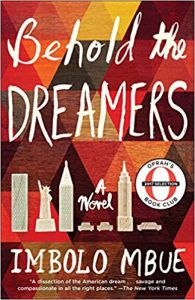A Book for Now: Behold the Dreamers by Imbolo Mbue
 Imbolo Mbue’s novel Behold the Dreamers has been on my mind as I’ve read about the thousands of migrants from Central America walking the long miles toward the United States. The fictional story about Jenda Jonga, an immigrant from Cameroon, could be the story of so many people who see America as the promised land. One of America’s central myths is that of the poor immigrant who amasses riches. Mbue’s take on it is powerful and original.
Imbolo Mbue’s novel Behold the Dreamers has been on my mind as I’ve read about the thousands of migrants from Central America walking the long miles toward the United States. The fictional story about Jenda Jonga, an immigrant from Cameroon, could be the story of so many people who see America as the promised land. One of America’s central myths is that of the poor immigrant who amasses riches. Mbue’s take on it is powerful and original.
Mbue herself is the embodiment of the immigrant success story. In 1998, an aunt sponsored her to come from her native Cameroon to study at Rutgers University. She went on to get a master’s degree from Columbia University. Behold the Dreamers, her debut novel, landed a million-dollar advance.
Jende Jonga, the book’s protagonist, came to New York with a temporary visa and grand hopes to get a green card and live the American dream. When we meet him in 2007, he is going to Lehman Brothers, the financial services firm in New York, to interview to be a chauffeur for Clark Edwards.
The interview is a make-or-break moment for Jonga, so he goes to great pains to impress Edwards. He visits a volunteer career counselor at a library to write his first-ever résumé, he dresses in a suit—the green double-breasted pinstripe suit he wore when he came to America and a clip-on tie—and he prepares for the questions with the help of his wife and Google. The search engine reveals that “Tell me about yourself” is asked at every job interview.
 Immediately we readers see the contrast between the job hunter and employer. Edwards is a busy man, typing into his Blackberry during the interview, while Jonga is sweating with anxiety and trying not to show his desperation. The interview concludes with Edwards telling him, “If you hope to further your career, you’ll get a better suit. Black, blue, or gray. And a real tie.” Jonga assures him that he will, though there is almost no way he can afford one. Needless to say, he gets the job.
Immediately we readers see the contrast between the job hunter and employer. Edwards is a busy man, typing into his Blackberry during the interview, while Jonga is sweating with anxiety and trying not to show his desperation. The interview concludes with Edwards telling him, “If you hope to further your career, you’ll get a better suit. Black, blue, or gray. And a real tie.” Jonga assures him that he will, though there is almost no way he can afford one. Needless to say, he gets the job.
The economic and cultural divide is at the heart of the story. On the one side there is the Jonga family—Jende, Neni, his wife, their son, Lioni, and later a baby daughter—and on the other, Clark and Cindy Edwards and their children, Vince, a law school student, and Mighty, a nine year old.
The Jongas live in a cockroach-infested Harlem apartment they illegally sublet for $500 a month. The Edwardses’ apartment is “millions of dollars more beautiful than their sunless one-bedroom apartment,” Jonga tells his wife after his first day at work. “ One could see the whole city through the window in their living room.”
Over the kitchen table, Jende and Neni look ahead to what they could do with his $35,000 salary and her $10,000 income as a home-health aide. “After we pay your taxes and my school fees and rent and send money back home and everything else, we can still save like three or four hundred dollars a month,” she says. Within seven or ten years, Neni would have a degree in pharmacy, and their future would be assured.
But we readers know what the Jongas don’t. While they’re enjoying their newfound riches, the financial crisis of 2008 is brewing with impending repercussions for them and the Edwards family.
Other tensions are playing out as well. Jonga’s immigration lawyer convinces him to seek asylum by claiming his father-in-law in Cameroon would kill him if he returned. That plan doesn’t look hopeful. Neni goes to work for Cindy Edwards at their vacation home and sees a side of her that is hidden from others. That revelation creates a bond, which, without giving away too much, does not always hold. The Edwards’ older son, a student at Columbia Law School, becomes close to Jende and confides that he rejects his parents’ wealth and aspirations that he become a lawyer and that he plans to move to India.
Mbue describes both families with great sensitivity. She explores the relationships within each family as well as the two families’ affection for each other. The Jonga and Edwards are complex people, not innocent Africans come to America or heartless Wall Street villains. We know the financial crash will come and create tensions, but we can’t foresee what will happen. Mbue has a deft hand.
In June 2017 Oprah Winfrey selected Behold the Dreamers for her book club, saying, “It’s got everything that’s grabbing the headlines in America right now. It’s about race and class, the economy, culture, immigration of the danger of the us-versus-them mentality.” That’s still true.
Janet Willen
Janet Willen is author of Speak a Word for Freedom: Women against Slavery (2015) and Five Thousand Years of Slavery (2011), written with Marjorie Gann and published by Tundra Books. Publishers Weekly called Speak a Word for Freedom an “engrossing study of female abolitionists from the 18th century to the present day” and gave the book a starred review. Five Thousand Years of Slavery was named a 2012 Notable Book for a Global Society by the International Reading Association and a Silver Winner in young adult nonfiction of ForeWord Reviews, and it received a starred review from School Library Journal. A writer and editor for more than thirty years, Janet has written many magazine articles and has edited books for elementary school children as well as academic texts and a remedial writing curriculum for postsecondary students. Janet lives in Silver Spring, Maryland.